Table of Contents
Artificial Intelligence (AI) is transforming various aspects of our lives, from enhancing productivity to enabling innovations in fields like healthcare, finance, and entertainment. However, with its rapid advancement comes a host of ethical challenges that must be navigated carefully. This article explores the ethical implications of AI, the challenges it presents, and the opportunities for responsible development and deployment.

Understanding the Ethical Landscape of AI
1. What is Artificial Intelligence?
Artificial Intelligence refers to the development of computer systems that can perform tasks typically requiring human intelligence. These tasks include learning, reasoning, problem-solving, and decision-making. AI encompasses a range of technologies, including:
- Machine Learning: Algorithms that enable systems to learn from data and improve performance over time without explicit programming.
- Natural Language Processing (NLP): The ability of machines to understand and generate human language.
- Computer Vision: The capability of machines to interpret and analyze visual information from the world.
2. Ethical Considerations in AI
The ethical considerations surrounding AI are broad and multifaceted, touching on issues such as privacy, bias, transparency, and accountability. Key ethical areas include:
- Privacy: The collection and use of personal data by AI systems raise concerns about data security and individual privacy.
- Bias and Fairness: AI algorithms can perpetuate or exacerbate existing biases in data, leading to unfair outcomes and discrimination.
- Transparency: The “black box” nature of some AI systems makes it difficult to understand how decisions are made, raising questions about transparency and accountability.
- Autonomy and Control: As AI systems become more autonomous, questions arise about the extent of human control and decision-making in critical areas.
Key Ethical Challenges
1. Data Privacy and Security
AI systems often rely on vast amounts of personal data to function effectively. This raises significant concerns about privacy and data security:
- Data Collection: The collection of personal data for AI training can lead to intrusive surveillance and potential misuse of information.
- Data Protection: Ensuring that sensitive data is securely stored and protected from unauthorized access is crucial for maintaining user trust.

2. Bias and Discrimination
AI systems are only as unbiased as the data they are trained on. Biases present in training data can lead to discriminatory outcomes:
- Algorithmic Bias: AI algorithms can reflect and perpetuate biases related to race, gender, socioeconomic status, and other factors.
- Mitigating Bias: Efforts to identify and address biases in AI systems are essential for promoting fairness and equity.
3. Transparency and Accountability
The decision-making processes of AI systems can be opaque, making it difficult to understand how outcomes are reached:
- Explainability: Ensuring that AI systems can provide explanations for their decisions is important for accountability and user trust.
- Accountability: Determining who is responsible for the actions of AI systems, especially when they cause harm, is a key ethical challenge.
4. Autonomy and Decision-Making
As AI systems become more autonomous, questions about human control and decision-making arise:
- Decision-Making Authority: Balancing the role of AI in decision-making with human oversight is crucial to maintain accountability and prevent over-reliance on machines.
- Ethical Dilemmas: Autonomous systems, such as self-driving cars or military drones, may face ethical dilemmas where decisions have significant moral implications.
Opportunities for Responsible AI Development
1. Ethical AI Design Principles
Adopting ethical design principles can guide the development of responsible AI systems:
- Privacy by Design: Incorporating privacy considerations into the design process to protect user data and ensure compliance with data protection regulations.
- Bias Mitigation: Implementing strategies to identify and mitigate biases in AI systems, including diverse data collection and fairness audits.
- Transparency and Explainability: Designing AI systems with mechanisms for transparency and explainability to foster user trust and accountability.
2. Collaboration and Regulation
Collaboration between stakeholders and the development of regulatory frameworks can promote responsible AI use:
- Industry Collaboration: Engaging with industry groups, researchers, and policymakers to develop best practices and standards for ethical AI.
- Regulation and Policy: Establishing regulatory frameworks to govern the use of AI, ensuring that it aligns with ethical standards and protects public interests.
3. Public Awareness and Education
Increasing public awareness and education about AI can foster informed discussions and ethical decision-making:
- Educational Programs: Developing educational programs to improve understanding of AI technologies and their ethical implications.
- Public Engagement: Engaging the public in discussions about AI ethics to ensure that diverse perspectives are considered in decision-making processes.
4. Ethical Research and Development
Promoting ethical research and development practices can drive innovation while addressing ethical concerns:
- Ethical Research Practices: Conducting research with a focus on ethical considerations, including the potential social impact and long-term consequences of AI technologies.
- Innovative Solutions: Exploring innovative solutions to address ethical challenges, such as creating more inclusive data sets and developing advanced explainability techniques.

The Future of AI Ethics
1. Evolving Ethical Standards
As AI technology continues to evolve, ethical standards and guidelines will need to adapt:
- Dynamic Ethics: Ethical frameworks must be flexible and adaptable to accommodate new developments and challenges in AI technology.
- Global Cooperation: International cooperation and dialogue will be essential for developing and implementing ethical standards that are globally relevant.
2. Balancing Innovation and Ethics
Striking a balance between fostering innovation and addressing ethical concerns will be crucial:
- Innovative Solutions: Encouraging innovation while ensuring that ethical considerations are integrated into the development process.
- Ethical Leadership: Promoting ethical leadership within organizations to prioritize responsible AI practices and decision-making.
Conclusion
The ethical implications of Artificial Intelligence are profound and multifaceted, encompassing issues related to privacy, bias, transparency, and autonomy. As AI technology continues to advance, addressing these ethical challenges is essential for ensuring that AI systems are developed and deployed responsibly. By adopting ethical design principles, fostering collaboration, and promoting public awareness, we can navigate the complex landscape of AI ethics and harness the opportunities that AI offers while safeguarding public interests and maintaining trust.